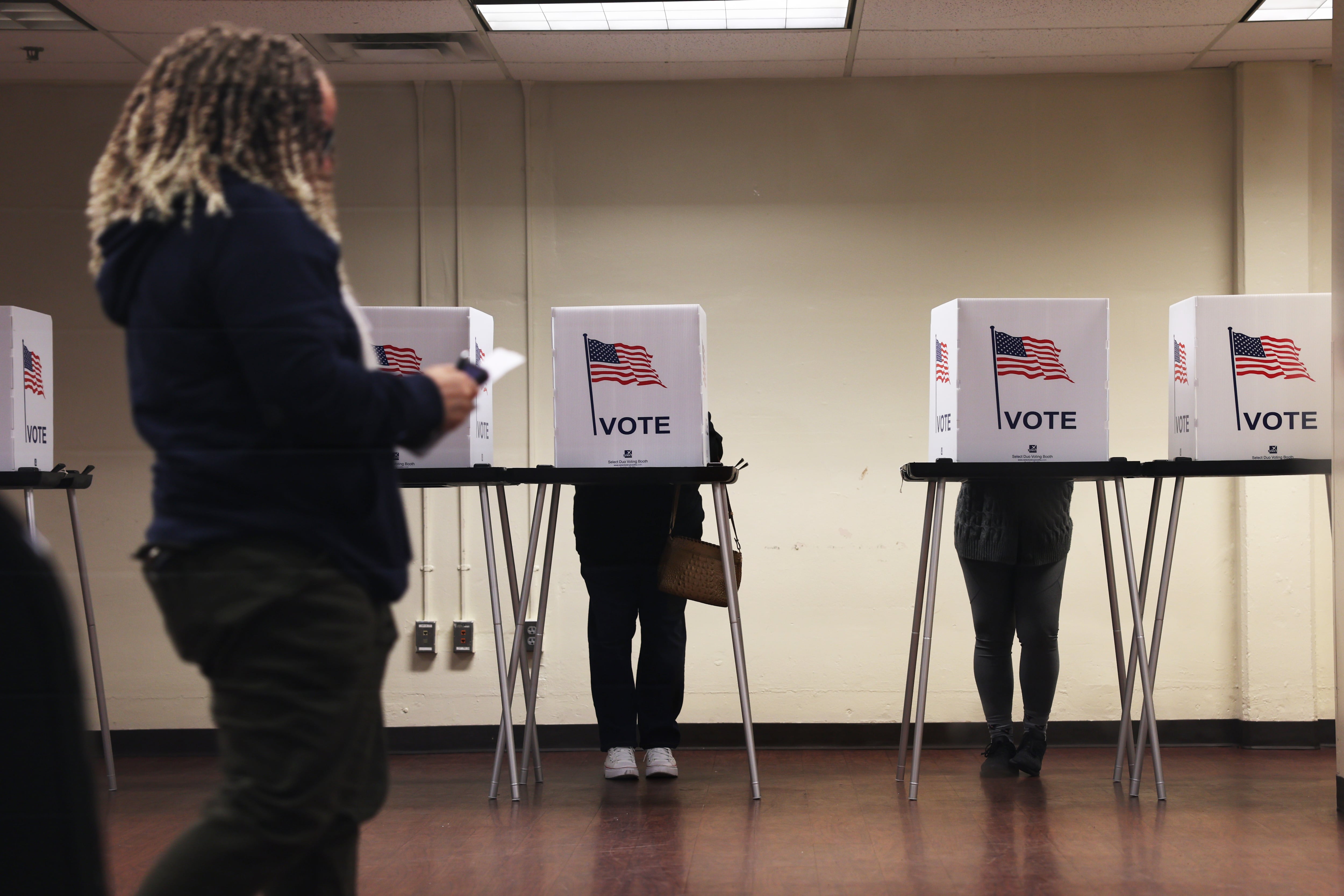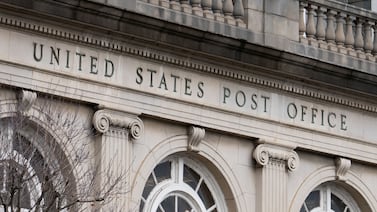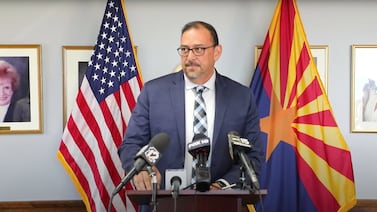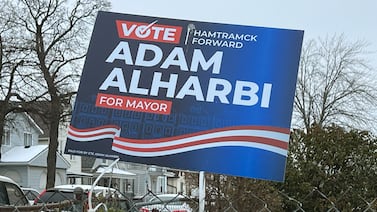Votebeat is a nonprofit news organization reporting on voting access and election administration across the U.S. Sign up for Votebeat Michigan’s free newsletter here.
A misleading claim promoted by right-wing activists has gained traction through X owner Elon Musk and other supporters of Donald Trump, feeding a false impression that there’s something wrong with Michigan’s voter rolls.
The claim — that Michigan has more voters than people eligible to vote — has been debunked extensively by the state as well as independent experts. A federal court ruling this week weighed in on a similar GOP claim, finding flaws in the comparison of data points and no proof that the discrepancy amounts to a violation of law, just as previous courts have found.
Musk and others cite the data points to argue that the discrepancy could enable fraudulent voting. The claim is based on a misunderstanding about the makeup of the state’s voter roll and what it means in relation to Census population data. It ignores the fact that the total number of registrations on the roll includes a large number of voters who are marked as inactive but who must be kept on the roll for several years under federal law. Most of those voters likely are no longer residents of the state.
The claim echoes a history of litigation from conservative organizations. Most recently, a lawsuit filed by the Republican National Committee in March argued that Michigan’s voter roll maintenance runs afoul of federal law, because 76 of Michigan’s 83 counties had voter registration rates higher than 90%. A federal judge’s ruling Tuesday shot that argument down, while also dismissing the suit on the basis that the RNC lacked legal grounds to bring it.
In her ruling, U.S. District Judge Jane M. Beckering noted that the plaintiffs “do not identify a single voter in any Michigan county who is ineligible to be registered but nonetheless appears as an active voter in the QVF,” referring to the qualified voter file.
Beckering agreed with the state’s characterization of the RNC’s complaint as an assertion that “something must be wrong with the Defendants’ program, but Plaintiffs do not know what it is.”
What is an active voter in Michigan?
The gist of the claim predates the RNC suit. For years, critics in public comments and lawsuits have alleged that Michigan cities and counties have more voters than eligible people. It’s a misunderstanding of who actually votes, and a claim typically used in an attempt to discredit the election in a critical swing state.
People may look at the number of residents 18 or older in Michigan (about 7.9 million in 2023, according to the U.S. Census Bureau) and the number of registered voters in Michigan (about 8.4 million, according to the Michigan Secretary of State’s office) and assume that there is a significant overcount in registered voters.
But these numbers are missing critically important context. Not every registered voter in Michigan is an active voter, which changes the math. An active voter is someone who has voted in the last six years or who has otherwise responded to a notice from the state government.
The Department of State confirms that Michigan has about 7.2 million active registered voters. That means that despite the state’s high registration rate, there aren’t more than 8 million people prepared to cast a ballot.
“There are about 1.2 million inactive records,” David Becker, executive director and founder of the Center for Election Innovation and Research, told Votebeat. “I always call them records, because they don’t represent voters. They’re people who left Michigan, who died.”
State law requires that the Secretary of State’s office maintain a list of inactive voters as a subset of registered voters. Those voters would still be eligible to vote, but if they cast an absentee ballot, it has to be treated in the same way as a challenged ballot. These ballots are counted as usual, but they are specially marked to identify them in case they need to be examined later under a court order.
If that voter showed up to vote in person, they would have to show their ID — like every voter in the state.
“It’s very small numbers who do, but they’ll still have to document that they’re in Michigan, still residing here, to activate their registration,” Becker said.
Under federal law, voters can’t be removed from the rolls before an election simply because they’re marked inactive. The National Voter Registration Act requires that a record cannot be removed unless that person has been inactive for at least two federal election cycles. That means that a voter who last voted in 2020 and has since been marked as inactive needs to be kept on the rolls until at least 2024. Also under the NVRA, officials cannot do large, systematic removals of voters during the 90 days before an election, known as the “quiet period.”
The Department of State says it has slated more than 600,000 voters on the roll for removal in 2025 or 2027.
Michigan’s voter list maintenance is “rigorous,” said Charles Stewart, professor of political science at MIT and director of the university’s Election Data and Science Lab. The efforts are bolstered by municipal clerks across the state, who, especially in smaller towns, often know the voters personally. In comparison, most states across the U.S. operate elections on a county level.
“Having this kind of list maintenance regime is kind of the price we pay for not living in a police state,” Stewart said, saying that other democratic countries have steep penalties for those who don’t inform officials of new addresses.
“We need a voter registration system that is as accurate as possible but also can be administered under this type of society in which we’re very reluctant to have big brother watching over our every move,” he said. “So we’re going to have imperfections, and we’re going to have safeguards within that imperfect system to keep to a very, very, very small minimum error.”
How does a Michigan voter get removed from the rolls?
If election officials learn that a voter has moved away from their jurisdiction, their registration will be canceled. If a voter dies or if there’s a duplicate registration, those too will be removed. Voters can also request that their registrations be canceled.
But it’s not a perfect system, which is part of what leads to a high number of inactive voters remaining on the roll. When someone dies, for example, that record is added to a list maintained by the Social Security Administration, according to the Department of State. The information is shared with the state, which then cancels registrations for any voters on the list. City and township clerks may also cancel registrations for dead voters if they have personal knowledge of the death — such as a published obituary or notification from a relative.
Sometimes, though, the Department of State isn’t able to confirm someone has died. In that case, that voter will be marked inactive and subject to the same removal timeline as other inactive voters.
If a voter moves within the state and updates their license with their new address, the state will automatically cancel that person’s previous registration and register them at their new location, the state said.
Out-of-state moves can be a bit more complex. There’s a group of states that share voter registration data with one another through the Electronic Registration Information Center, or ERIC. If another state flags that a Michigan voter is registered in that state, it triggers Michigan to send a notice of cancellation to that voter’s Michigan address. If the voter doesn’t respond and remains inactive, they are removed.
But not every state participates in ERIC — many Republican-led states have withdrawn from it in recent years — which can slow the process of finding an inactive voter who has moved.
A significant number of Michigan voters have been registered in recent years since the state enacted automatic voter registration through a 2018 constitutional amendment. As part of that, any eligible resident who applies for, updates, or renews their driver’s license or state ID is automatically registered to vote. (That’s one reason why about 81% of Michigan’s 18-year-olds were registered to vote as of Oct. 8.) That same amendment allowed Michigan voters to register on the day of an election.
A history of lawsuits
Claims that Michigan voters outpace the number of people able to vote have circulated before. In 2020, similar allegations arose in the city of Detroit, where people — including Trump — claimed that Detroit had more votes than residents in the city, resulting in a turnout above 100%.
This was never true either. In 2020, about 257,000 people voted in the city, compared with the 506,000 registered voters (and 639,000 people living there).
People made similar claims about townships throughout the state later that year — and again, those were untrue.
It’s those kinds of claims that fuel doubt about election results in Michigan, officials and experts say, despite the numerous measures designed to make the state’s elections secure and fair. Other states face such claims, too.
A 2018 study on the problem from the Brennan Center, written by Jonathan Brater — then counsel for the center’s Democracy Program and now Michigan’s director of elections — found that many efforts encouraging states to purge voter rolls in the name of list maintenance rely on claims that are “exaggerated and even flatly contradicted by the same sources of evidence on which they are based.”
One of those groups was the Public Interest Legal Foundation, a conservative group based in Virginia best known for suing states over their voting rolls. In its efforts to get local jurisdictions to change how elections are handled, PILF often included inactive voters in its analysis of registered voters. It also didn’t consider where data from the Census Bureau might not accurately reflect the local population, such as areas with significant student or military populations. PILF reached out to nearly three dozen Michigan counties between 2015 and 2017, the Brennan Center found, and along with three other core groups, more than 450 jurisdictions across the U.S. in its demands for mass removals from the rolls.
Not many of those jurisdictions were sued, but those that were targeted were predominantly communities with large minority populations, the report found.
“Good voter list maintenance benefits us all, and jurisdictions should strive to have top-flight practices,” Brater wrote in 2018. “Election officials should be wary, however, of exaggerated or false claims used to demand more purging.”
In a statement addressing Tuesday’s dismissal of the RNC lawsuit, Secretary of State Jocelyn Benson said the court “dismissed a lawsuit designed to plant false seeds of doubt about the integrity of my work and our elections.”
All valid votes will be counted, she said, adding that she was grateful the court “affirmed our vigorous work to maintain the accuracy of Michigan’s voter rolls.”
Hayley Harding is a reporter for Votebeat based in Michigan. Contact Hayley at hharding@votebeat.org.






